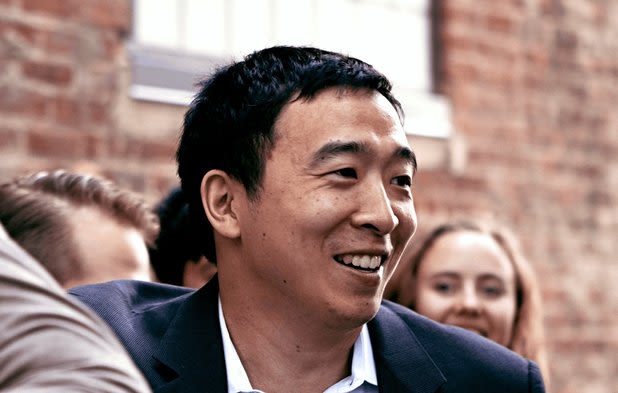
After black eyes such as the Facebook-Cambridge Analytica data scandal and reports revealing Amazon had thousands of workers reviewing Alexa conversations, public sentiment toward Big Tech has taken a hit as of late. A recent Pew Research Center study found 50% of Americans say technology companies have a positive influence on the way things are going in the U.S., down from 71% in 2015, and 33% say tech companies have a negative influence, up from 17% in 2015.
But Democratic presidential candidate Andrew Yang wants America to know techies “are not all a–holes,” as he recently told the Los Angeles Times Editorial Board.
Yang is best known for his plan to give all Americans ages 18 and over $1,000 a month free cash via a universal basic income, or UBI, payment. And Yang, who is a former tech entrepreneur, told the Times that under his plan, tech companies would be forced to help pay for his so-called “freedom dividend” through a value added tax, or VAT — but some individuals in the industry are proactively supporting him, he said.
“I’m happy to say that I have hundreds of techies who support me on this. They’re not all a–holes,” Yang said.
Yang said some of these supporters are people who work for big companies such as Google and Amazon. In fact, the Yang campaign has a list of technology leaders it says have pledged $1,000 or more to the campaign it calls the Tech 1,000. Yang’s campaign says the list includes Twitter and Square founder Jack Dorsey, Open AI CEO Sam Altman, Zappos CEO Tony Hseih and Google product management director Scott Johnston.
Dorsey, Altman, Hseih and Johnston have all donated to Yang, according to OpenSecrets.org, a public database of political donations. Altman has also donated to Sens. Elizabeth Warren, D-Mass., Cory Booker, D-N.J., and Kamala Harris, D-Calif., and South Bend, Indiana, Mayor Pete Buttigieg). Hseih also donated to Booker.
According to Yang, his UBI would be paid for, at least in part, by a VAT on each transaction businesses make. Though such a VAT would be levied on all companies, Yang often highlights the contribution the large tech companies would make because they in particular are benefiting from the technology that is, according to Yang, displacing many workers. There is some debate, however, as to how robots will impact the job market for humans overall. Additionally, the current federal tax structure allows some of these companies and others to pay relatively minimal tax bills.
“Amazon is the most prominent example. Amazon is [a $1 trillion] company that literally paid zero in taxes last year, and that’s not unusual. They routinely pay zero or near zero in taxes,” Yang told the Times. Amazon, which currently has just over a $900 billion market cap, paid $0 in U.S. federal income tax on more than $11 billion in profits before taxes in 2018 and received a $129 million tax rebate from the federal government.
An Amazon spokesperson did not have a comment specifically about Yang’s statements, but told CNBC Make It, “Amazon pays all the taxes we are required to pay in the U.S. and every country where we operate, including paying $2.6 billion in corporate tax and reporting $3.4 billion in tax expense over the last three years.” Amazon also mentioned its investment and job creation in the U.S.
“If you look at putting a tax in place that harnesses the value that’s getting generated by these companies who are the biggest winners in the 21st century economy, it is the Amazons, Googles, Facebooks, Ubers of the world, ” Yang told the Times.
“And … when we devise artificial intelligence that replaces hundreds of thousands of clerical workers, how much of that value is the American public going to see? Right now in our current system: zero. Because the global tech company that comes up with that artificial intelligence will just move their earnings through Ireland, and the American public will see zero. ” (Apple was forced to settle with the European Union for underpaying taxes in Ireland.)
Yang says his proposed VAT would help level the playing field.
“Companies like Facebook, Amazon, Twitter, and Google are the clear winners in this economy right now and yet they aren’t paying much in taxes, so a VAT would hit them harder and force them to pay their fair share,” Yang campaign spokesperson Madalin Sammons tells CNBC Make It.
Apple, Uber, Google and Facebook did not immediately respond to CNBC Make It’s requests for comment.
Yang told the Times that artificial intelligence and automation are resources that all U.S. residents should benefit from the way Alaska residents all get a piece of the state’s oil riches through its Alaska Permanent Fund. Alaska pays the annual Permanent Fund Dividend to residents from oil profits (it was $1,600 each in 2018).
“They don’t means-test it. They’re just like, ‘If you’re in Alaska, you get your money.’ And they pay for it with oil money,” Yang said. A critical difference, however, is that the government of Alaska owns the oil riches it is distributing the proceeds from while the big tech companies Yang would tax to pay for what he calls “the Freedom Dividend” are private corporations.
“What I’m saying to the American people is that technology is the oil of the 21st century. That when I have artificial intelligence that can do the work of hundreds of thousands of call center workers … Right now, how much of that value is the American public going to see?”
Andrew Yang
Andrew Yang presidential election campaign website media download

